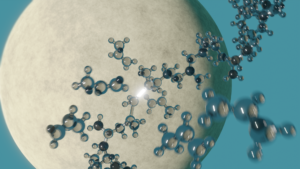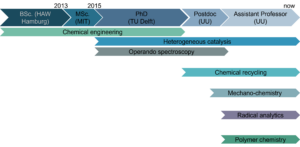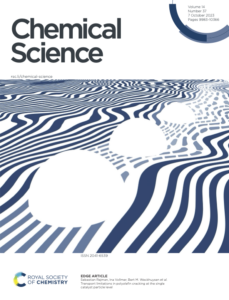Research
Research
Researcher unique identifier (ORCID): 0000-0001-9917-1499
UU Website: https://www.uu.nl/staff/IVollmer
X: @InaVollmer_DE
Linkedin: https://www.linkedin.com/in/ina-vollmer-84327959/
News
A recent article on NewScientist explains how Mechanochemistry is the new chemistry, featuring our work.
Watch the 1 minute Eye-opener by PhD student Adrian Hergesell on Mechano-catalytic depolymerization.
Ina Vollmer featured in the newspaper Het Financieele Dagblad (subscription only, Dutch).
Read the recent interview about the Catalytic Extrusion project together with project partner Coperion.
Want to learn more about our research? Watch Ina Vollmer’s Youtube lecture as part of the CMCC Mechanochemistry discussion series
ERC Starting grant, NWO Demonstrator grant and Circular plastics grant for mechano-catalysis
Het Parool (Dutch) reports on our technology of converting plastic via force instead of heat in the ball mill.
Research
The majority of plastic waste is landfilled, burned or leaks to the environment. Unfortunately, only 12 % (by weight) is recycled globally, mainly because the predominantly applied recycling technique of melting and re-extrusion produces a lower quality plastic. Therefore, chemical depolymerization of plastic has been studied to produce monomers which can be used to make high-quality plastic again. For polyolefins, however, only a very mixed, low value hydrocarbon stream was obtained thus far.4 This is because thermal cracking of the strong polyolefin bonds evokes random bond scission, uncontrolled further reaction and thus the formation of various products besides monomers.
My expertise is in mechano-chemistry1 and mechano-catalysis2-4, chemical recycling of plastics,5-9 and heterogenous catalysis8-10 as well as polymer chemistry and radical analytics. I teach polymer chemistry and electron spin resonance spectroscopy.
The research of the plastic recycling team focusses on developing pathways for the low temperature selective chemical recycling of plastic waste to chemical building blocks like aromatics,6, 7 carboxylic acids9 and monomers1-3. I am especially interested in using mechano-catalysis to drive the depolymerization and cracking reactions of polyolefins. Mechano-chemistry is a rather less developed field of chemistry where reactions are driven not by thermal energy, electrons or photons but rather by mechanical strain, which can lower the activation energy needed to be overcome for bond cleavage. This strain can, for example, be applied in a ball mill.
 We developed a surface activated mechano-catalyst (SAM cat), which we patented.2-3 Instead of adding catalyst as powder to the ball mill, we functionalize the grinding spheres directly. This significantly improves performance. The catalyst is placed right where the energy input into the system is the highest, at the impact point of the spheres. In addition, it avoids difficulties in bringing the powder catalyst, polymer and grinding spheres together at the same location at the same time.
We developed a surface activated mechano-catalyst (SAM cat), which we patented.2-3 Instead of adding catalyst as powder to the ball mill, we functionalize the grinding spheres directly. This significantly improves performance. The catalyst is placed right where the energy input into the system is the highest, at the impact point of the spheres. In addition, it avoids difficulties in bringing the powder catalyst, polymer and grinding spheres together at the same location at the same time.
Supervised Postdocs:
Dr. Laëtitia Delarue
Dr. Viviana Ospina
Supervised PhDs (co-supervisor Bert Weckhuysen):
Sarah Schmidt
Laura Seidling
Simone Mosk
Adrian H. Hergesell
Co-supervised PhDs (main promoter Bert Weckhuysen):
Sebastian Rejman
Tom Smak
Jochem van de Minkelis
En Chen
Graduated PhDs (main promoter Bert Weckhuysen):
Michael Jenks
Kordula Schnabl
Alumni:
Claire L. Seitzinger
Videos/Webinars:
- 2022, “Is a world without plastics possible?” , studium generale of UU
- 2021, “Is chemical recycling of plastics the future”, Royal Society of Chemistry
- 2021, “Turning the tide on plastic”, The Conference Board
Open Science:
I lead the activities towards digitalization in the group according to the principle of findable, accessible, interoperable and reusable data (FAIR). We have set up a procedure for data storage on the Yoda server of UU that is then published openly via a doi link. We have also set up a group wiki and electronic lab journals and are currently setting up a server infrastructure to automatically back up all raw measurement data from over 40 lab instruments.
(1) Aydonat, S., Hergesell, A. H., Seitzinger, C. L., Lennarz, R., Chang, G., Sievers, C., Meisner, J., Vollmer, I., & Göstl, R., Leveraging mechanochemistry for sustainable polymer degradation. Polymer Journal, 2024, 56(4), 249–268. https://doi.org/10.1038/s41428-023-00863-9
(2) Hergesell, A. H., Baarslag, R. J., Seitzinger, C. L., Meena, R., Schara, P., Tomović, Ž., Li, G., Weckhuysen, B. M., & Vollmer, I. Surface-Activated Mechano-Catalysis for Ambient Conversion of Plastic Waste. Journal of the American Chemical Society 2024, 146(38), 26139–26147. https://doi.org/10.1021/jacs.4c07157
(3) Vollmer, I., Hergesell, A.H., Seitzinger, C.L, Baarslag, R.J., patent application, EP24170863.5
(4) Vollmer, I., Hergesell, A.H., Weckhuysen, B.M., patent application, PCT/NL2023/050544
(5) Vollmer, I., Jenks, M.J.F., Roelands, M.C.P, White, R.J., van Harmelen, T., de Wild, P., van der Laan, G.P., Meirer, F., Keurentjes, J.T.F., Weckhuysen, B.M., Beyond Mechanical Recycling: Giving New Life to Plastic Waste. Angew. Chem. Int. Ed. 2020, 59 (36), 15402–15423, doi.org/10.1002/anie.201915651
(6) Vollmer, I., Jenks, M. J. F., González, R. M., Meirer, F. & Weckhuysen, B. M., Plastic Waste Conversion over a Refinery Waste Catalyst. Angew. Chem. Int. Ed., 2021, 60 (29), 16101–16108, doi.org/10.1002/anie.202104110
(7) Rejman, S., Vollmer, I., Werny, M., Meirer, F., Vogt, E., Weckhuysen, B. M., Transport Limitations in Polyolefin Cracking at the Single Particle Level, Chem. Sci., 2023, 14(37) 10068-10080, doi. org/10.1039/D3SC03229A (data available at: doi.org/10.24416/UU01-72ZJU1)
(8) Thevenon, A., Vollmer, I., Towards a Cradle-to-Cradle Lifecycle for Polyethylene, Angew. Chem. Int. Ed., 2023, 62 (3), e202216163, doi.org/10.1002/anie.202216163
(9) Smak, T. J., de Peinder, P., van der Waal, J. C., Altink, R., Vollmer, I., & Weckhuysen, B. M., Oxidative Conversion of Polyethylene Towards Di-Carboxylic Acids: A Multi-Analytical Approach. ChemSusChem, 2023, 17 (7), e202301198. doi.org/10.1002/CSSC.202301198
(10) Vollmer, I., Kosinov, N. Szécsényi, Á, Li, G., Yarulina, I, Abou-Hamad, E., Gurinov, A., Ould-Chikh, S., Aguilar-Tapia, A. Hazemann, J.L., Pidko, E., Hensen, E. J. M., Kapteijn, F., Gascon, J., A site-sensitive quasi in-situ strategy to characterize Mo/HZSM-5 during activation, J. Catal. 2019, 370, 321-331, doi.org/10.1016/j.jcat.2019.01.013
(11) Vollmer, I., van der Linden, B., Ould-Chikh, S., Aguilar-Tapia, A., Yarulina, I., Abou-Hamad, E., Sneider, Y.G., Olivos Suarez, A.I., Hazemann, J.L., Kapteijn, F., Gascon, J., On the dynamic nature of Mo sites for methane dehydroaromatization, Chem. Sci. 2018, 9 (21), 4801–4807, doi.org/10.1039/C8SC01263F
(12) Vollmer, I., Ould-Chikh, S., Aguilar-Tapia, A., Li, G., Pidko, E., Hazemann, J.L., Kapteijn, F., Gascon, J., Activity Descriptors Derived from Comparison of Mo and Fe as Active Metal for Methane Conversion to Aromatics. J. Am. Chem. Soc. 2019, 141 (47), 18814–18824, doi.org/10.1021/jacs.9b09710
(13) Vollmer, I., Abou‐Hamad, E., Gascon, J., Kapteijn, F., Aromatization of ethylene–main intermediate for MDA?, ChemCatChem 2020, 12 (2), 544-549, doi.org/10.1002/cctc.201901655
C.V.
C.V.

2021 – now Assistant professor in Chemistry, Utrecht University (UU), The Netherlands
2019 – 2021 Postdoctoral fellow in Chemistry, UU, The Netherlands
11/03/2019 PhD in Chemical Engineering/Heterogenous Catalysis, Delft University of Technology (TUDelft), The Netherlands, supervisors: Prof. Freek Kapteijn and Prof. Jorge Gascon
2015 Master in Chemical Engineering, Massachusetts Institute of Technology (MIT), The United States
2013 Bachelor in Process Engineering, Hamburg University of Applied Science (HAW Hamburg), Germany
Successful grants:
- 2024, Demonstrator grant of the Dutch Research Council (NWO) (160k Euro)
- 2024, European Research Council Starting Grant (ERC StG) (1.625 million Euro)
- 2024, National Growth Fund Circular plastics NL Grant (660k Euro)
- 2023, Private partnership subsidy (PPS) funding with Carboliq GmbH as industrial partner, received from TKI Groene Chemie & Circulariteit (108k Euro)
- 2022, Open competition XS grant by NWO for groundbreaking high-risk ideas (50k Euro).
- 2021, Veni grant for conducting 3 years of independent research (250k Euro) by the Talent program of NWO.
Invited lectures:
- 2024, CHAINS conference, The Netherlands
- 2024, CMCC Mechanochemistry discussion series, online
- 2024, German Chemical Society (GDCh) Makro, Dresden, Germany
- 2024, Cell Press Symposium, Cardiff, United Kingdom
- 2024, Max Planck Institute (MPI) for Sustainable Materials, Düsseldorf, Germany
- 2024, GDCh lecture series at Heinrich Heine University Düsseldorf, Germany
- 2024, MPI for Dynamics of Complex Technical Systems, Magdeburg, Germany
- 2023, American Chemical Society (ACS) Fall Meeting, San Diego, USA
- 2023, Celebration of the Stratingh Institute at University of Groningen, Groningen, The Netherlands
- 2023, Center for Zeolites and Nanoporous Materials of the French National Center for Research (CNRS) upon invitation of Prof. Svetlana Mintova, Caen, France
- 2023, American Chemical Society Green Chemistry & Engineering Conference, online
- 2022, ACHEMA, Frankfurt, Germany
- 2022, European Industry and Energy Summit, Amsterdam, Germany
- 2022, University of Cambridge, online
- 2022, Advanced Research Chemical Building Blocks Consortium (ARC CBBC) annual symposium, Groningen, The Netherlands
- 2022, Technical University of Ilmenau, Ilmenau, Germany
- 2021, ACS Spring Meeting, San Diego, USA
Editorial activity, moderating, organization of symposia:
- 2024, editor for Applied Catalysis A: General
- 2023, guest editor for a joint themed issue “Plastic conversion” of the journals Catalysis Science & Technology and Polymers, https://doi.org/1039/D3PY90069J
- 2021, moderator of panel discussion on chemical recycling of plastics during the 10th Anniversary Symposium of the Catalysis Science & Technology
- 2021, organizer of focus session on recycling of plastics supported by ARC CBBC at the CHAINS conference in the Netherlands.
- Peer review for ACS Sustainable Chemistry & Engineering, Angewandte Chemie, Applied Catalysis A and B, Chemical Engineering Journal, Energies, Journal of Catalysis, Nature Chemistry, ACS Catalysis, Separation and Purification Technology, and Applied Sciences. I also review proposals for the Flanders Innovation & Entrepreneurship (VLAIO) Moonshot program and the Stanford Synchroton Radiation Lightsource (SSRL) and am in the topic committee of the International Catalysis Conference (ICC) in 2024.
Teaching:
- 2023, We developed a new MSc. program at UU on sustainable and circular chemistry starting in 2024, in which we promote interdisciplinary research. We integrate life cycle, technoeconomic and toxicity assessment as well as systems thinking, societal and environmental impact into the curriculum centered around catalysis and chemistry.
- 2022, together with three other PIs, we developed a BSc. level polymer chemistry course at UU of which I am the coordinator.
- Since 2021, I am teaching electron spin resonance spectroscopy in the BSc. level course “Spectroscopy of Molecules and Materials” at UU
- Since 2021, together with another PI, we developed a BSc. level sustainable chemistry course that we teach at the University College Utrecht (UCU)
- Since 2021, I teach a guest lecture on chemical recycling of plastics at the Hogeschool Utrecht (HU)
- Since 2021, I teach a guest lecture on transport phenomena in heterogeneous catalysis at UU
Committee work:
- Since 2023, member of the faculty of science council of UU.
- Since 2023, member of the faculty advisory board research IT looking at ways to promote open science and data at the faculty of science at UU
- Since 2022, board member of the Institute for Sustainable and Circular Chemistry (ISCC) at UU.
- 2022-2023, member of the committee assessing and promoting the societal, economic and judicial impact of research at UU.
- Since 2021, member of ARC CBBC
Journalistic experience:
- 2011-2017, journalistic education via a scholarship from the German Konrad-Adenauer foundation
- 2014, internship as scientific journalist at the magazine MIT Technology Review in Hannover, Germany (6 weeks)
- 2012, internship as business editor at Nation Multimedia Group in Bangkok, Thailand (2 months)
- 2012, internship at the German Press Agency (DPA) (2 months)
News
A New Way of Recycling Plastics – with Adrian
Ever wanted to know how ball milling works? In an easy to understand outreach video, Adrian Hergesell explains how ball milling works, and how it can help in recycling plastics […]
Read moreThree grants for Ina Vollmer
Assistant professor Ina Vollmer has recently received an ERC Starting Grant of 1.6 million euros, the Incubator grant from Circular Plastics NL for 660k euros and a NWO Demonstrator grant of 160k […]
Read moreTwo available PhD Positions: Mechano-Catalytic Depolymerisation of Plastic Waste
Are you looking to do a PhD project and are you interested in catalysis, spectroscopy, mechano-chemistry, or polymer science to develop a sustainable pathway for plastic waste recycling through mechano-catalytic […]
Read moreTwo ICC projects received funding within National Growth Fund programme Circular Plastics NL
How do we ensure that we can reuse plastic packaging material? Or how can dyes in PET bottles be reused and contribute to making plastics circular? Two research projects within […]
Read moreIna & Ward received an NWO XS grant for curiosity-driven research
Ina Vollmer and Ward van der Stam (both ICC) have received an NWO XS grant of 50.000 euro for curiosity-driven research into new ways to recycle plastic and CO2. Ina […]
Read moreWhere has all the plastic gone? Ina Vollmer & Florian Meirer interviewed about plastic in the environment
Ina Vollmer and Florian Meirer have been interviewed for an in-depth article about plastic in the environment: 99 percent of all the plastics in the ocean is missing. We know […]
Read morePublications
Catalytic Pyrolysis of Polyethylene with Microporous and Mesoporous Materials: Assessing Performance and Mechanistic Understanding Journal Article
In: ChemSusChem, vol. 18, no. 7, 2025, (Cited by: 0; All Open Access, Hybrid Gold Open Access).
External acidity as performance descriptor in polyolefin cracking using zeolite-based materials Journal Article
In: Nature Communications, vol. 16, no. 1, 2025, (Cited by: 0; All Open Access, Gold Open Access).
Toward a Circular Economy of Heteroatom Containing Plastics: A Focus on Heterogeneous Catalysis in Recycling Journal Article
In: Langmuir, vol. 41, no. 10, pp. 6429 – 6456, 2025, (Cited by: 0).
Leveraging mechanochemistry for sustainable polymer degradation Journal Article
In: Polymer Journal, 2024, (Cited by: 2; All Open Access, Hybrid Gold Open Access).
Oxidative Conversion of Polyethylene Towards Di-Carboxylic Acids: A Multi-Analytical Approach Journal Article
In: ChemSusChem, vol. 17, no. 7, 2024, (Cited by: 8; All Open Access, Hybrid Gold Open Access).
Leveraging mechanochemistry for sustainable polymer degradation Journal Article
In: Polymer Journal, vol. 56, no. 4, pp. 249 – 268, 2024, (Cited by: 14; All Open Access, Green Open Access, Hybrid Gold Open Access).
Unravelling potential reaction intermediates during catalytic pyrolysis of polypropylene with microscopy and spectroscopy Journal Article
In: Catalysis Science and Technology, vol. 52, 2024, (Cited by: 2; All Open Access, Green Open Access, Hybrid Gold Open Access).
Operando UV–Vis diffuse reflectance spectroscopy insights into the methane dehydroaromatization reaction over Mo/H-ZSM-5 catalysts Journal Article
In: Journal of Catalysis, vol. 436, 2024, (Cited by: 0).
Surface-Activated Mechano-Catalysis for Ambient Conversion of Plastic Waste Journal Article
In: Journal of the American Chemical Society, vol. 146, no. 38, pp. 26139 – 26147, 2024, (Cited by: 2; All Open Access, Hybrid Gold Open Access).
Green Additives in Chitosan-based Bioplastic Films: Long-term Stability Assessment and Aging Effects Journal Article
In: ChemSusChem, vol. 17, no. 13, 2024, (Cited by: 2; All Open Access, Hybrid Gold Open Access).
Catalytic Pyrolysis of Polyethylene with Microporous and Mesoporous Materials: Assessing Performance and Mechanistic Understanding Journal Article
In: ChemSusChem, 2024, (Cited by: 0).
Conduction Band Tuning by Controlled Alloying of Fe into Cs2AgBiBr6 Double Perovskite Powders Journal Article
In: Advanced Functional Materials, vol. 34, no. 50, 2024, (Cited by: 3; All Open Access, Green Open Access, Hybrid Gold Open Access).
Green Additives in Chitosan-Based Bioplastic Films: Physical, Mechanical, and Chemical Properties Journal Article
In: ChemSusChem, vol. 16, no. 20, 2023, (Cited by: 0; All Open Access, Hybrid Gold Open Access).
Towards a Cradle-to-Cradle Polyolefin Lifecycle Journal Article
In: Angewandte Chemie - International Edition, vol. 62, no. 3, 2023, (Cited by: 2).
Introduction to Plastic Conversion Journal Article
In: Catalysis Science and Technology, vol. 13, no. 13, pp. 3737 – 3739, 2023, (Cited by: 0).
Conduction Band Tuning by Controlled Alloying of Fe into Cs2AgBiBr6 Double Perovskite Powders Journal Article
In: Advanced Functional Materials, 2023, (Cited by: 1; All Open Access, Green Open Access, Hybrid Gold Open Access).
Oxidative Conversion of Polyethylene Towards Di-Carboxylic Acids: A Multi-Analytical Approach Journal Article
In: ChemSusChem, 2023, (Cited by: 0).
Transport limitations in polyolefin cracking at the single catalyst particle level Journal Article
In: Chemical Science, vol. 14, no. 37, pp. 10068 – 10080, 2023, (Cited by: 4; All Open Access, Gold Open Access, Green Open Access).
Microbial Communities on Plastic Polymers in the Mediterranean Sea Journal Article
In: Frontiers in Microbiology, vol. 12, 2021, (Cited by: 54; All Open Access, Gold Open Access, Green Open Access).
Plastic Waste Conversion over a Refinery Waste Catalyst Journal Article
In: Angewandte Chemie - International Edition, vol. 60, no. 29, pp. 16101 – 16108, 2021, (Cited by: 68; All Open Access, Green Open Access, Hybrid Gold Open Access).
Beyond Mechanical Recycling: Giving New Life to Plastic Waste Journal Article
In: Angewandte Chemie - International Edition, vol. 59, no. 36, pp. 15402 – 15423, 2020, (Cited by: 695; All Open Access, Green Open Access).
In: Nature Chemistry, vol. 10, no. 8, pp. 897, 2018, (cited By 1).
Structure–performance descriptors and the role of Lewis acidity in the methanol-to-propylene process Journal Article
In: Nature Chemistry, vol. 10, no. 8, pp. 804-812, 2018, (cited By 84).
In: Nature Chemistry, vol. 10, no. 8, pp. 897, 2018, (Cited by: 4; All Open Access, Bronze Open Access).
Relevance of the Mo-precursor state in H-ZSM-5 for methane dehydroaromatization Journal Article
In: Catalysis Science and Technology, vol. 8, no. 3, pp. 916 – 922, 2018, (Cited by: 42; All Open Access, Green Open Access).
Structure–performance descriptors and the role of Lewis acidity in the methanol-to-propylene process Journal Article
In: Nature Chemistry, vol. 10, no. 8, pp. 804 – 812, 2018, (Cited by: 209; All Open Access, Green Open Access).
Other publications
See earlier publications on Scopus.
Cover Gallery

Chemical Science
2023, Vol. 14, Issue 37

